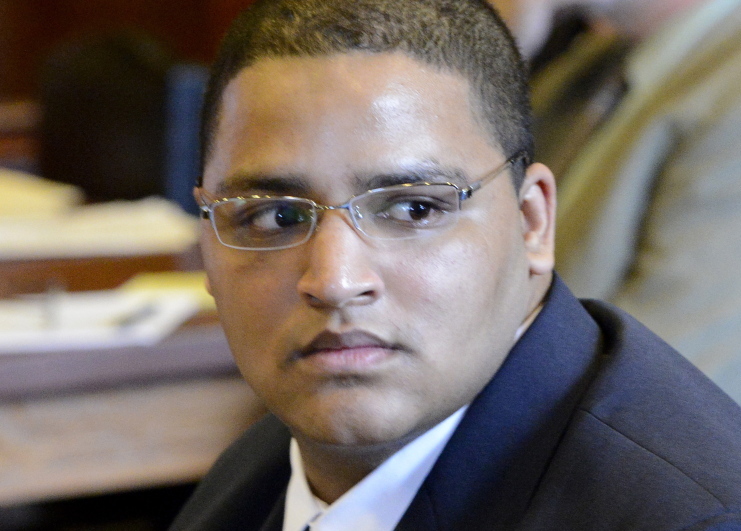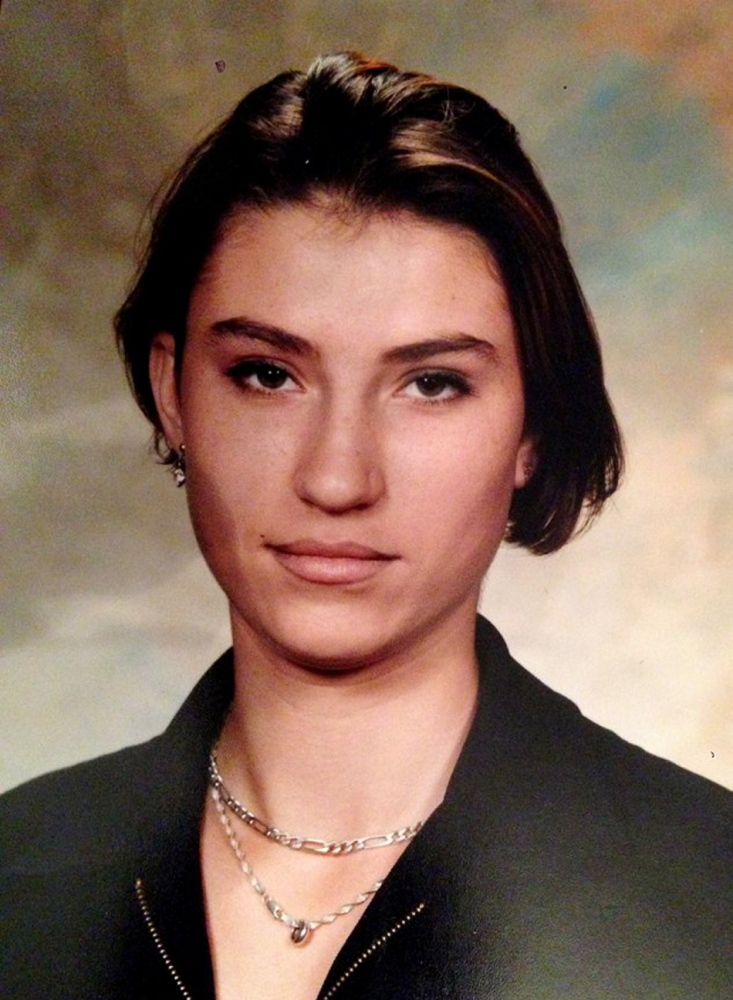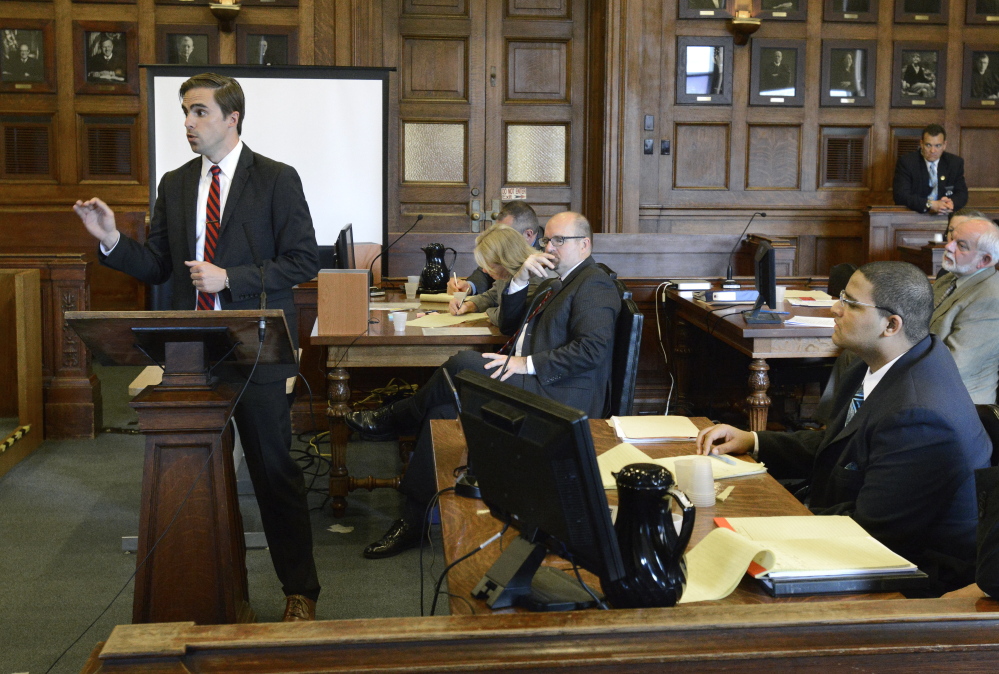Anthony Pratt Jr. was found guilty of murder Thursday by a jury that wasn’t persuaded by defense arguments that other people had motives to kill his married lover, Margarita Fisenko Scott.
The jury reached its verdict after deliberating eight hours, weighing eight days of testimony at the Cumberland County Courthouse in Portland. Pratt was charged with shooting Scott in a Portland apartment in 2012 and leaving her body inside an SUV in a motel parking lot.
Pratt faced forward, his expression hidden from spectators, as the verdict was read. The courtroom was crowded with members of the victim’s family, police, lawyers and the media. The jury forewoman hesitated briefly before announcing the verdict, adding to the tension.
Pratt, dressed in a dark suit jacket and tie, turned around shortly after the verdict and raised his eyebrows while looking at his grandfather, Rudolph Debethem, who was sitting in the spectator section of the courtroom.
Pratt’s attorneys had presented evidence that DNA from two other people, Christopher Jennings and his wife, Tunile, was found on the grip and trigger of the .40-caliber handgun used to kill Scott. The jury also apparently gave little weight to evidence that Christopher Jennings was the last person to have sex with Scott before she was killed, and that just hours before Scott died, Tunile Jennings threatened to kill her if she ever had sex with Christopher Jennings.
The jury found that Pratt, 21, of the New York City borough of Queens, shot Scott on Nov. 11, 2012, in the living room of an apartment at 266 West Concord St., where Pratt was living with the Jenningses, whom he knew from New York City. Police say Pratt killed Scott while the Jenningses were out at nightclubs between 1 and 3 a.m., cleaned up the blood and disposed of Scott’s body before they got home.
Scott’s husband, Cary Scott, testified that he didn’t know his wife was dead until he discovered her body more than two months later in the back of a Chevrolet Trailblazer in the parking lot of Motel 6 on Riverside Street in Portland.
Police and other witnesses said Pratt had followed Scott to the Westbrook apartment she shared with her husband the day before the murder and assaulted her for returning to her husband. A police officer’s photograph of Scott from that day showed her bruised and wearing the same clothes she had on when her body was found.
Witnesses testified that Pratt and Christopher Jennings were crack cocaine dealers who smuggled drugs from New York to sell in Portland. Pratt became romantically involved with Scott after she bought drugs from him.
Deputy Attorney General Lisa Marchese applauded the jury’s verdict, especially in light of the complexity of the case and the police department’s efforts to piece together what happened months after Scott was killed.
“This was a very difficult case,” Marchese said. “We had to deal with Chris Jennings as an alternate suspect.”
Both of the Jenningses admitted on the witness stand last week that they repeatedly lied to police during their investigation.
By the time police began the investigation, the Jenningses had moved away from West Concord Street and their former apartment was under renovation. Crime scene investigators rebuilt a section of the living room wall from construction debris after finding evidence of blood stains on the floor that were no longer visible to the naked eye. They discovered the bullet that killed Scott embedded in a wall stud, and the piece of gum and paper with Pratt’s DNA that was used to plug the bullet hole.
“I am grateful to the jury. They clearly took the time and looked over all the evidence and made the right decision,” Marchese said.
Pratt’s attorney Peter Cyr was “disappointed” with the jury’s verdict because there was so much conflicting evidence.
“I thought there was reasonable doubt, and I think there was reasonable doubt because of Christopher Jennings. He lied throughout this investigation to help himself and no one else. And to come to a decision to find Anthony (Pratt) guilty, you had to trust Christopher Jennings,” Cyr said.
Cyr asked Justice Thomas Warren for 45 days to prepare for sentencing. Pratt faces a prison term of 25 years to life.
“Obviously, we’re going to be following through with all of the appeal avenues that are available,” Cyr said.
Debethem, Pratt’s grandfather, sat on a bench outside the courtroom with a family friend after the verdict and wiped tears from his eyes.
“I don’t know what to say,” Debethem said.
Scott’s cousin, Rita Hillard, acted as a spokeswoman for the victim’s extended family, which gathered outside the courthouse after the verdict to speak to the media.
Scott’s parents and grandmother, who immigrated to the U.S. from Kazakhstan and speak very little English, sat through much of the trial listening to the testimony through a Russian translator. Her aunts and other relatives, who speak English more fluently, also sat through nearly the entire trial.
“We are very relieved and thankful,” Hillard said. “I think the hardest part was sitting there and listening to it all, knowing she wasn’t there to speak for herself or defend herself.”
Scott’s relatives moved to the Portland area over the last two decades and remain close.
Hillard said it was painful for the family to hear how quickly Scott became addicted to drugs and realize they hadn’t had time to intervene.
“She was very young. She was 29. She didn’t have a chance to improve herself,” Hillard said.
Neither Christopher nor Tunile Jennings was charged in Scott’s murder, although police found the murder weapon and crack cocaine hidden in their new apartment at 63 Berkshire St. in Portland.
Christopher Jennings, a convicted felon, is prohibited by law from possessing a firearm.
The lead investigator in the case, Portland Police Detective Richard Vogel, testified that he submitted paperwork to prosecutors seeking to charge Christopher Jennings for illegal possession of both the gun and drugs, but prosecutors declined to pursue those charges.
Christopher Jennings now faces a felony cocaine trafficking charge in an unrelated case in Portland and remains free on bail.
Send questions/comments to the editors.





Success. Please wait for the page to reload. If the page does not reload within 5 seconds, please refresh the page.
Enter your email and password to access comments.
Hi, to comment on stories you must . This profile is in addition to your subscription and website login.
Already have a commenting profile? .
Invalid username/password.
Please check your email to confirm and complete your registration.
Only subscribers are eligible to post comments. Please subscribe or login first for digital access. Here’s why.
Use the form below to reset your password. When you've submitted your account email, we will send an email with a reset code.